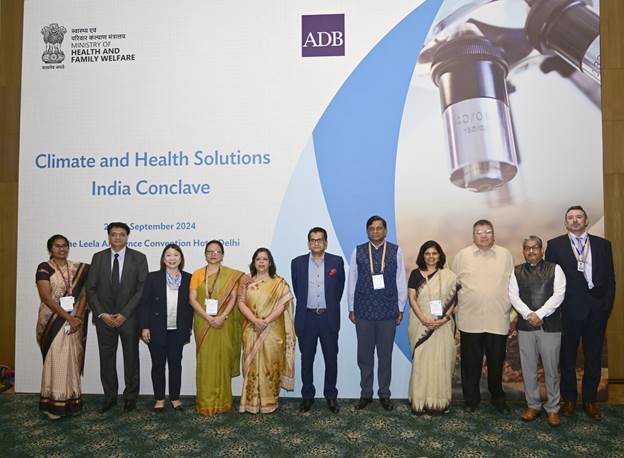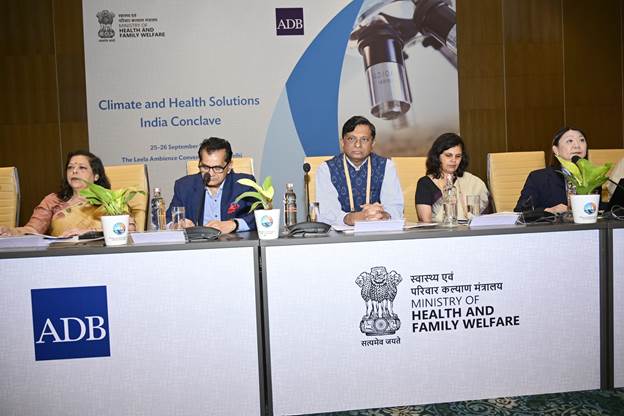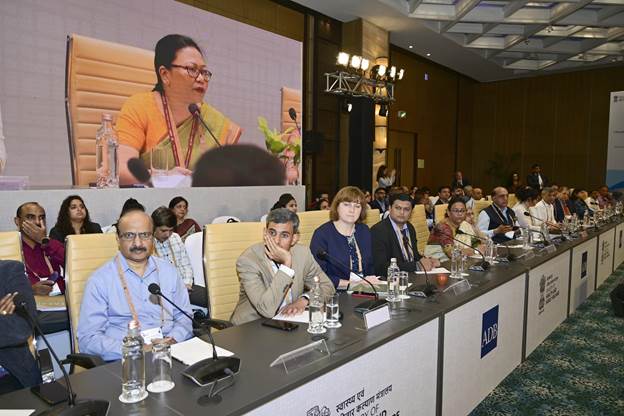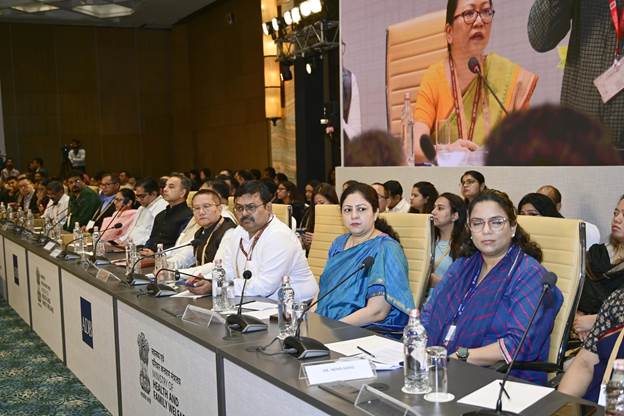Climate and Health Solutions (CHS) India Conclave jointly organized by Ministry of Health and Family Welfare, Government of India and Asian Development Bank inaugurated today in Delhi
Climate and Health Solutions (CHS) India Conclave jointly organized by Ministry of Health and Family Welfare, Government of India and Asian Development Bank inaugurated today in Delhi
The Ministry of Health and Family Welfare (MoHFW), Government of India, in collaboration with the Asian Development Bank (ADB), inaugurated the Climate and Health Solutions (CHS) India Conclave at Delhi. The two-day conclave aims to address the twin emergencies of climate change and public health by bringing together policymakers, experts, and stakeholders to develop actionable strategies for India’s health sector.

Shri Apurva Chandra, Secretary, MoHFW, in his keynote address highlighted the urgent need for integrating climate considerations into health planning. He said that “The Climate and Health Solutions India Conclave is a testament to our commitment to building a climate-resilient health system that addresses the unique needs of developing nations like ours. India is leading by example, integrating climate considerations into our health policies and emergency response mechanisms.”

Shri Apurva Chandra further added that “we are proud to collaborate with the Asian Development Bank and other global partners to ensure that our health sector is equipped to tackle unforeseen climate impacts and support sustainable development for all. Together, we can achieve the vision of ‘One Health, One Family, One Future.”
Addressing the gathering, Ms. Punya Salila Srivastava, OSD, Ministry of Health and Family Welfare, highlighted the steps taken to integrate climate considerations into health planning. She said “India has taken proactive steps in integrating climate change considerations into its public health policies. A pivotal moment in this journey was the creation of the Mission on Climate Change and Health, nearly a decade ago, under the Prime Minister’s Council on Climate Change. In 2019, the Ministry of Health and Family Welfare introduced the National Programme on Climate Change and Human Health (NPCCHH) under the National Health Mission.”

She further added that India’s National Action Plan on Climate Change and Health has served as a blueprint for nearly all States and Union Territories to develop their respective State Action Plans. The next ambition, for a whole-of-government and whole-of-society approach, is for each district to assess their vulnerability and develop tailored climate change and health action plans.
Shri Amitabh Kant, G20 Sherpa, Government of India, in the Presidential Address, emphasized the importance of India’s leadership, scale and size in demonstrating the leapfrogging of development pathways at the intersection of climate change and health for India and the world, remarking, “As we confront rising temperatures, unpredictable weather patterns, and the growing burden on healthcare systems, it is critical that we design integrated, sustainable solutions that safeguard the health of our people and our planet. India’s leadership through the G20 Presidency has been instrumental in bringing this issue to the global forefront, and through collaboration with key partners like the Asian Development Bank, we have a unique opportunity to shape resilient and adaptive health systems. Together, we can forge a path that ensures the well-being of future generations while addressing the urgent imperatives of climate action.”

Ms. Leena Nandan, Secretary, Ministry of Environment, Forest and Climate Change, discussed India’s progress on sustainable development and the country’s commitments to climate and environmental goals. Underscoring the significance of cross-sectoral collaboration to achieve climate resilience, she stated, “We need macro-planning to address the challenges posed by climate change, particularly in areas like health and resource management. Health system readiness is key to adapting and ensuring a coordinated, complete, and comprehensive approach.”
Ms. Ayako Inagaki, Senior Director, Human and Social Development Sector Office, Sectors Group, Asian Development Bank stated, “The convergence of climate change and public health presents an urgent challenge that demands collaborative action. India’s vast and diverse landscapes make it a key battleground for addressing climate-induced health risks. Through collective efforts, we can build resilient, sustainable health systems capable of withstanding the evolving impacts of climate change. The Climate and Health Solutions India conclave marks a significant step toward uniting policymakers, experts, and stakeholders in shaping a healthier, climate-resilient future for all.”
From pledges to implementation, India is leading the climate and health movement from global agenda building to national-level contextualization, and on-ground execution. The conclave, including participation from various government agencies such as the Ministry of Environment, Forests and Climate Change (MoEFCC), G20 Secretariat, National Centre for Disease Control (NCDC), Indian Meteorological Department (IMD), and National Disaster Management Authority (NDMA), aims to foster dialogue on building climate-resilient health systems, infrastructure and supply chains. Leading development partners, private institutions and respective representatives from the state governments and the private sector have been invited to share their experiences and insights.
During the conclave, participants will engage on in-depth strategic and operational deliberations on eight deep-dive roundtable discussions on topics such as Adapting to Climate Change through Urban Heat Mapping and Management, Climate, Vector-Borne Diseases and One Health, Surveillance and Early Warning Systems, Health Based Action for Clean Air, Addressing Non-Communicable Diseases (NCDs), Mental Health and Nutrition, and Climate Resilient and Responsive Health Infrastructure and Systems for Extreme Weather Events.
The call for action and package of CHS conclave outcomes includes stimulating dialogue on a nuanced understanding of climate and health challenges and tailored policies for different states and stakeholders in the country, co-creating a comprehensive roadmap and implementation plan to formulate robust policies, initiatives and innovations, identifying core climate and health process, product and technology innovations that can be piloted, scaled and mainstreamed in national and sub-national health plans, and to initiate public and private sector engagement in designing and delivering climate resilient healthcare. The CHS India Conclave underscores the dedication of the Government of India and the Asian Development Bank in advancing climate and health solutions in alignment with international and national leadership and commitments of India.
******